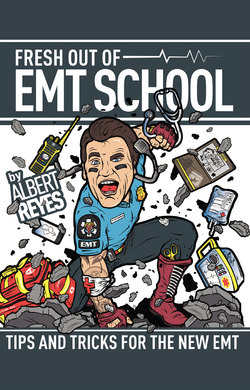Читать книгу FRESH OUT OF EMT SCHOOL - Albert Reyes - Страница 4
На сайте Литреса книга снята с продажи.
FRESH OUT OF EMT SCHOOL… WHAT TO DO NOW?
ОглавлениеHOW TO START
So you’re fresh out of school and now you want a job. Good. Getting your EMT certification will open up many doors for your life! All of my experience will come from working on an ambulance, but there are numerous jobs EMT's can do. They can work in the Fire Service (most firefighters are EMT's), in a hospital as an ER Tech, at an amusement park or sporting event — the list goes on and on. So get going.
EMT's are in high demand so start searching in your area.
Start doing ride-alongs or volunteering wherever you can, on an ambulance or with your local Fire Dept. It all looks good on your resume and in your interview.
Get ready for that National Registry Test. There are many books to help you study for that. Go to emtb.com, cram.com or quizlet.com and search for EMT National Registry.
APPLY NOW
The fear of not being hired stops most people from even applying. Don't believe it. Go and apply at your county ambulance provider. Most of you will want to work 911 right away but BLS (Basic Life Support) is where most EMT's start off. Don't let BLS scare you away.
BLS does not respond to 911 calls but can be called on when ambulance levels are low in the county. BLS will mostly do inter-facility transports, long distance transports, appointments, courthouse standbys, sports standbys, etc. They are sometimes more busier than ALS and will help you gain a lot of experience before transferring to an ALS system.
One of the myths is that they are not hiring right now. I've seen so many people not apply because they heard that they are not hiring. Go and apply for yourself and let them tell you they are not hiring. In EMS you will also have to knock on doors more than once. Apply again and again. Don't worry about bugging them. Sometimes persistence pays off. Be determined!
People will tell you that you need this and that to get hired. That they are only looking for medics, you need to speak a foreign language, etc. Go and apply. Apply everywhere. You may not get the first EMS job you apply for—it's ok. You will gain experience while you are waiting to get hired at your dream job, and that experience will eventually help you get where you want to be. Remember, companies will hire somebody with experience over somebody who has none. You may have to work BLS for a while. I worked on Basic Life Support, Critical Care Transports, Neonatal Intensive Care Unit, Pediatric Intensive Care Unit transports, Lifelight transports, and ALS inter-facility transports. Put your time and work in. It’s worth it.
RIDE ALONGS/VOLUNTEER IN ER
Go prepared. Always do research and have questions ready to ask when the moment comes. Have necessary equipment on you to do your basic EMT skills. Dress to impress. Iron your clothes, shine your boots, and tuck in your shirt. There's nothing worse than a sloppy looking EMT. Smile and meet as many people as possible. You never know who will be on your interview panel as you are getting hired. Your attitude should show some humility and an eagerness to learn. Be respectful and listen to directions. Bring a notepad and take notes. Get in there and do some patient care. Don't wait for them to tell you your job. Get your hands dirty!
THE OFFERING
What I'm going to tell you right here is going to score you major points. When doing ride-alongs or volunteering in an ER, know that everybody in EMS loves FOOD, COFFEE, AND SWEETS! Do not come empty handed! Make sure you bring an “Offering” of your appreciation. Gift cards and thank you cards are greatly appreciated. Just don't come empty handed. This will probably be free for you so come prepared and share a small token of your gratitude for this experience.
THE INTERVIEW
Again, dress to impress. Shave and make sure you smell good. Use proper language. I used to sit on interview panels, and wearing a suit shows professionalism. It won't disguise your attitude and heart but it sure makes you look good. It is a must. Show them that you are serious about EMS and professionalism. Don’t forget to give a nice firm handshake and make eye contact with everyone in the room. The first handshake will often make or break you because it is the interviewer’s first impression of you. It starts there in the interview room. Do mock interviews with friends, coworkers, and family. Everything helps.
Go prepared by studying beforehand. Read some books on going through an interview. You should have an answer for every question. Be familiar with what questions they might be asking you. Find somebody that went through the process. Ask them what questions they were asked and what you should be prepared for. Most interviews will start off with a question related to “Tell us about yourself.” Be able to give the panel an inside look of you personally and professionally. Most interviews will also have scenario questions about patient care or scene safety. One of the most important questions will come at the end with, “Do you have anything to add?” Have a summative “speech” prepared explaining why you are a good fit for the position and don’t forget to thank the panelists for their time. Be prepared to take a written or skills test right on the spot. Brush up on your assessments, scope of practice, and anatomy/physiology. Be prepared for anything.
